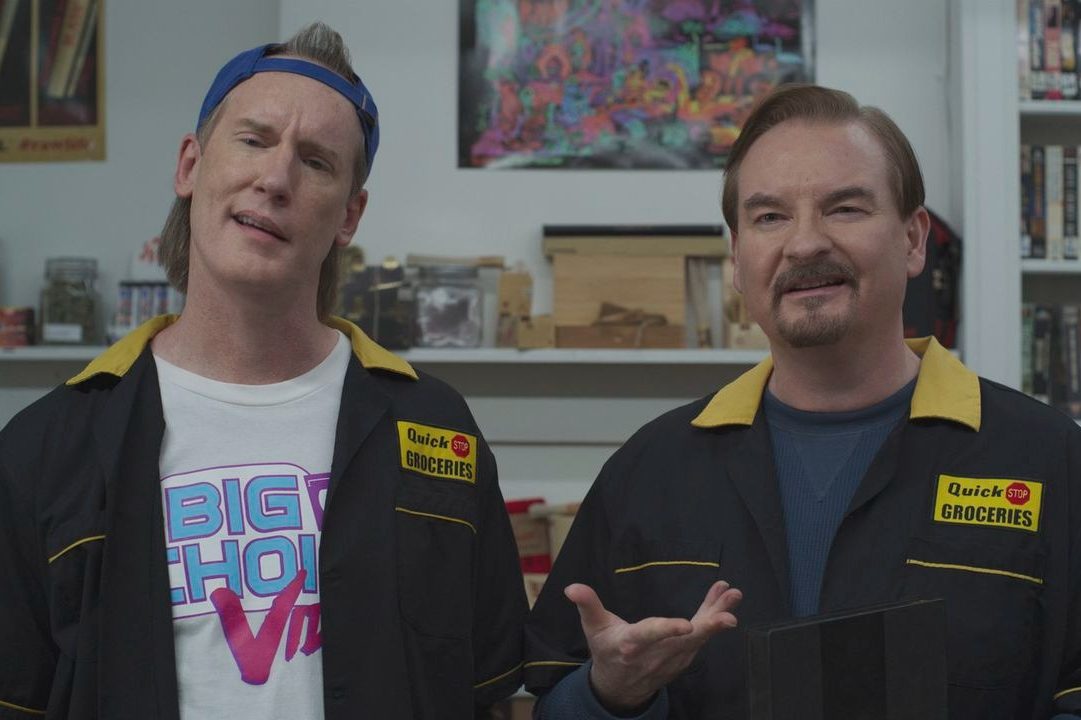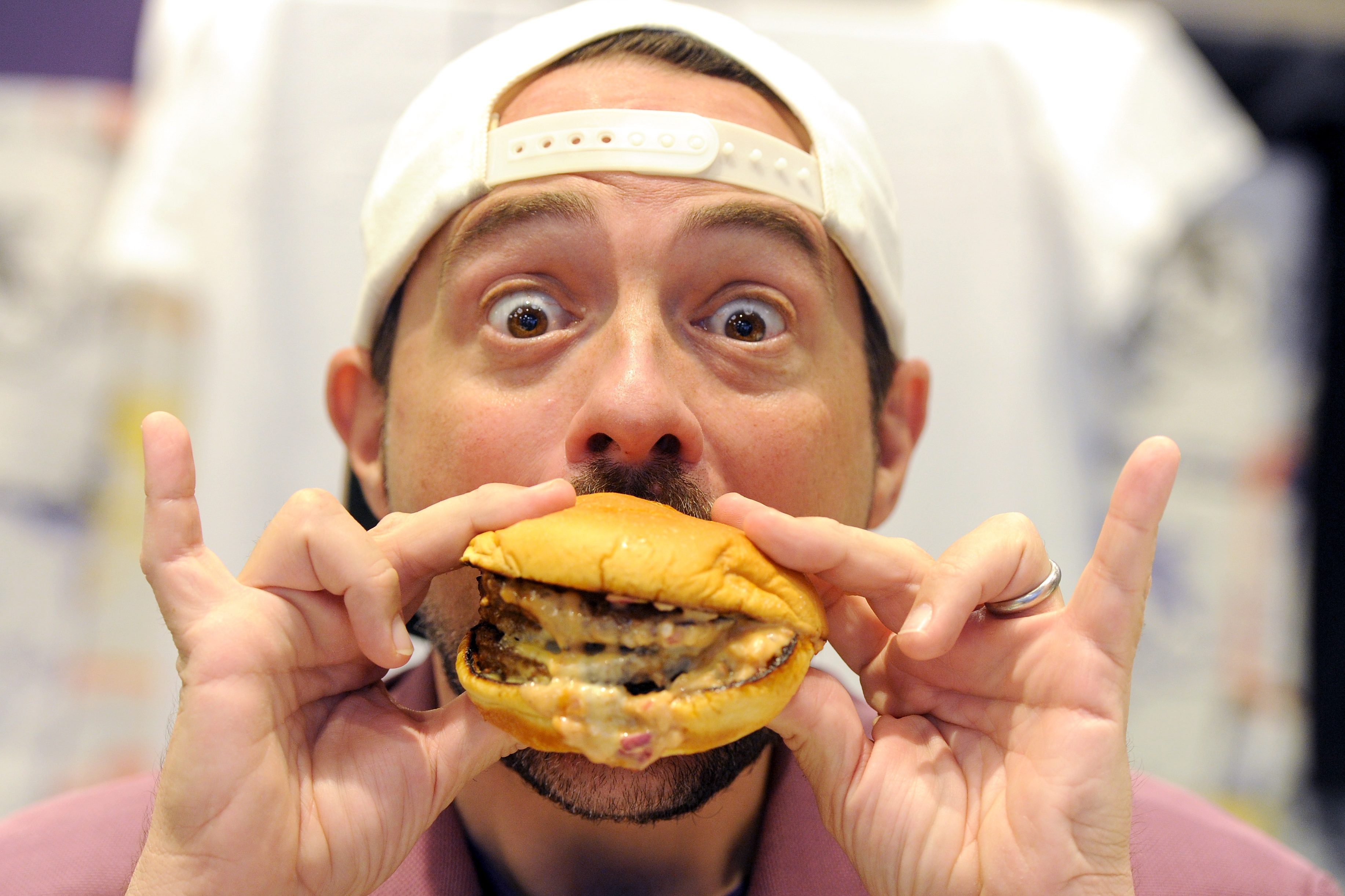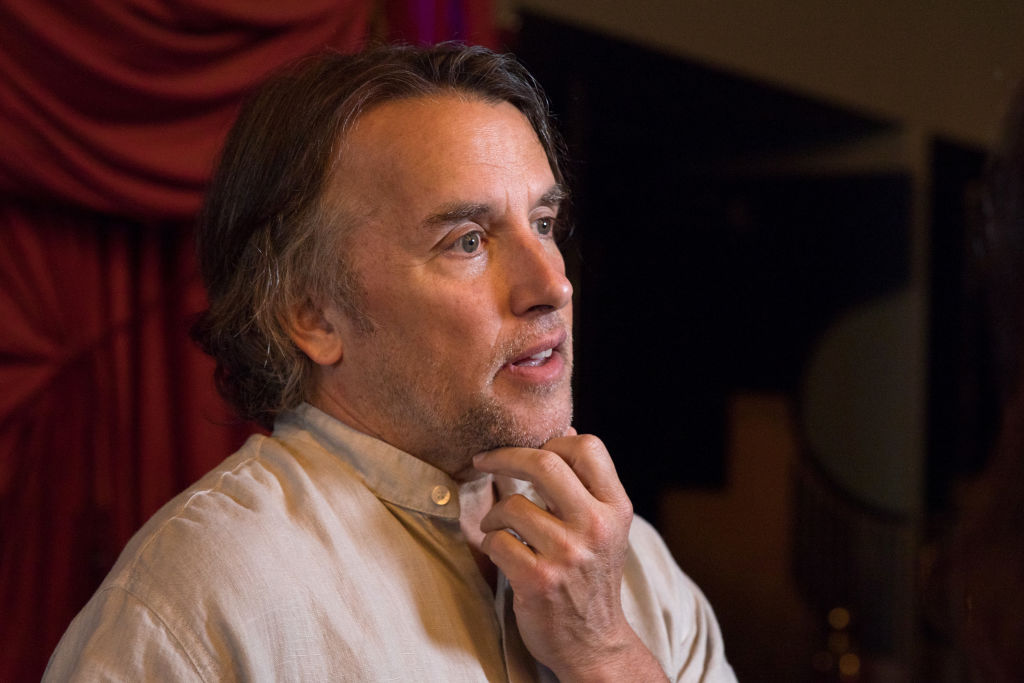In Kevin Smith’s new movie Clerks III, Dante (Brian O’Halloran) and Randal (Jeff Anderson), the behind-the-counter slackers who gave profane, loquacious voice to Gen-X obsessions and frustrations in the beloved comedy Clerks, make a movie themselves, based on their own convenience-store lives, with the help of local stoner clowns Jay and Silent Bob. This is not to be confused with Smith’s movie Jay and Silent Bob Strike Back, where his other comic duo goes to Hollywood to stop production on a movie based on their lives, or his recent years-later revisitation Jay and Silent Bob Reboot, where the same duo goes to Hollywood again to stop production on a reboot also based on their lives, or his unrelated 2008 project Zack and Miri Make a Porno, where an amateur porn shoot (with a cast including Jeff Anderson) becomes a proxy for retelling Smith’s experiences making a low-budget movie. But Clerks III is not only the most recent film in which Smith re-examines his DIY mythology; it’s also the most maudlin, checking back in with Dante and Randal and finding genuine tragedy exceeding the expected middle-age regrets.
In that way, both Clerks sequels pull Dante and Randal closer to ground level, rewriting the rules of Smith’s original “Jersey trilogy.” That was the informal name for no-budget Clerks, big-studio Mallrats and back-to-basics Chasing Amy before it became clear that it wouldn’t just be three-and-done for Smith and his Jersey characters. Soon the trilogy was up to five, with the ambitious religious fantasy-comedy Dogma and the self-reflexive Jay and Silent Bob Strike Back, intended to bring the saga to a close. Clerks II reopened the book in 2006, and the movies Smith has made since then (whether Jersey-related or not) have been, on average, sloppier and/or more self-indulgent. Even his release strategies — touring shows or single-showtime Fathom Events, both of which are in effect for Clerks III — are tributes to the cult of his personality.
It’s easy to read Smith’s increasingly repetitive and hermetic universe as a domed-off self-tribute — so easy, in fact, that it’s a little surprising that comfort king Smith himself, who seems fonder than ever of easy laughs, doesn’t make a bigger joke of it in Clerks III. Then again, there’s probably another Jay and Silent Bob comedy down the line for those purposes. By comparison, Clerks III is serious business, not least because its comedic stylings are largely and dispiritingly unfunny. Though it features countless references and callbacks to the 1994 original, Clerks III finds Smith losing more than a step on his own brand of comic banter. Early on, when Randal has a heart attack in the QuickStop store that he and Dante own together, he’s rushed to a hospital, where Anderson is forced to huff and puff through an ongoing dick-size gag, opposite a wacky doctor played by Amy Sedaris; meanwhile, Elias (Trevor Fehrman), the younger clerk introduced in Clerks II, undergoes a conversion from Christianity to Satanism out of guilt, a gag that runs for the rest of the movie. The movie’s insistence on Elias being a crucial part of QuickStop lore is one of many ways Clerks III feels like a 16-years-later legacy sequel to Clerks II more than a follow-up to the original Clerks.
In that long progression through long, redefining gaps, Clerks III also resembles — and here’s the weird twist — Richard Linklater’s Before Midnight, retroactively turning the whole trilogy into Smith’s answer to Linklater’s Before series. The Linklater movie that became part of Smith’s personal mythology, of course, is Slacker, a free-flowing anthology of characters and monologues that convinced Smith he, too, could make movies. “I’d never imagined… myself as a storyteller, let alone a filmmaker. But he held a mirror up to a world I knew, even though it was a world away. Richard Linklater made it seem possible,” he told PBS in 2017. Slacker’s influence on Clerks is clear, yet Linklater’s Before Sunrise, a walk-and-talk romance that debuted just as Clerks was finishing up its arthouse run, is arguably even more simpatico with Smith’s chatty style. Linklater revisited his not-quite-couple Jesse (Ethan Hawke) and Celine (Julie Deply) for 2004’s Before Sunset, just a couple of years before Clerks II returned to Dante and Randal (now fast-food workers and, in a weird coincidence, released the same year as Linklater’s Fast Food Nation). Before Midnight completed the trilogy in 2013, with the couple now married — and possibly on the rocks. Clerks III deals in similarly sobering terms: failing health, lingering grief, life’s disappointments.
Characteristically, it’s Randal who makes the impulsive, post-hospitalization plan to write and direct his own magnum opus about that convenience-store life, while Dante hems and haws, just like he did about playing hockey on the roof in the first Clerks (a hobby that has been codified into routine now that he and Randal own the business). They’re a couple with recognizable and, to some extent, unchangeable dynamics, just like Jesse and Celine. Despite the insular pleasure Smith takes in taking curtain calls with his Jersey pals, further drawn out by the notion of Randal making his own Clerks (and the sheer lack of offscreen Clerks adventures Randal draws upon for his screenplay), he is willing to serve up some discomfort, too. In particular, the way he undoes the happy ending that seemed to be within Dante’s reach at the end of Clerks II is so bracing that it borders on sour.
That’s part of why I can’t outright dismiss Clerks III, even though it didn’t make me laugh much, even though the treatment of Rosario Dawson’s character from Clerks II irritated me, even though Smith sometimes seems to be getting worse at directing as he gets more experience. (For all of its static, point-and-shoot utility, there is nothing in Clerks as crudely assembled as the jarring, pointless camera-angle switches that dot some of the dialogue scenes here.) In between his in-jokes and his recitations of the holy nerdbro scripture (“I’m not even supposed to be here today,” Star Wars references, “37!” and so on), Smith can’t stop himself from searching for greater meaning. Like Linklater, he seems fascinated by the passage of time — even if that primarily means reflecting on his passage of time — and the way it presses forward inexorably, in defiance of the happy endings we’re so often sold by the movies.
Smith is, to be clear, manifestly not Richard Linklater, who complements his eye for everyday humanity with curiosity, versatility and a prolific output of movies (not podcasts, which seem to be Smith’s real calling these days). Yet Smith does seem to want the best for his characters, which makes it all the more startling when he doesn’t actually provide it, whether in terms of plot turns or memorable new dialogue that can stand alongside the original. As its most compelling, Clerks III is haunted by the question of what would have happened to Smith if he hadn’t been the recipient of lottery-level luck (and, yes, some genuine talent).
The movie’s answer is not particularly satisfying; it may not be particularly insightful, either, and there’s a weirdly maudlin self-satisfaction in Smith presenting it to his loyal audience, obviously assuming some of them will be in tears by the end. Still, at its core, Clerks III is far from a betrayal of the original Clerks: It’s an acknowledgment that much of life is a potential purgatory that we must find a way out of. It’s clear that Smith himself feels like he’s escaped — even if he’s maybe created a whole new artistic limbo for his work in the process.
This article was featured in the InsideHook newsletter. Sign up now.























